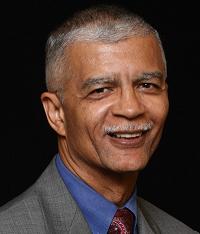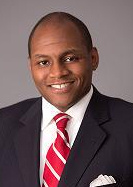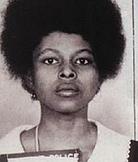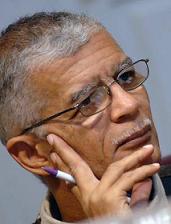
JACKSON – (AP) An attorney who was active in a black nationalist group decades ago and still refers to a client as a “former Black Panther heroine'' is running for mayor of Mississippi's capital city.

Can Chokwe Lumumba persuade voters that he's a mainstream politician concerned about a diverse swath of people?
That's a big question he faces businessman Jonathan Lee in Tuesday's Democratic primary runoff in Jackson.
The Democratic nominee is expected to become mayor. No Republican is in the race, and three lesser-known independent candidates are on the June 4 general election ballot. The new term begins July 1.
In the May 7 Democratic primary, Lee placed first, Lumumba was second and current Mayor Harvey Johnson Jr. finished third in a field of 11 candidates.
Jackson is Mississippi's largest city, though its population has dropped significantly in the past two decades as people have moved to the suburbs. The Census Bureau estimates Jackson had 175,561 residents in 2011; 79 percent are black and 18 percent are white.
Johnson became the city's first black mayor in 1997. He served two terms, lost in 2005 and was re-elected in 2009.
Both of the Democrats remaining in the mayor's race this year are African-American.

Lee, a 35-year-old businessman, is receiving significant financial support from business people, including many whites who make up the city's longstanding economic power structure. A campaign commercial shows Lee in church with his wife and young daughter; it ends with “UNITY'' in all capital letters. He said during a debate Jackson can succeed only if people work together from all parts of the city.
“It's going to take every last one of us,'' Lee said.
Lumumba, 65, has served the past four years on the Jackson City Council. He said there's no reason people should be concerned about his work in the 1970s and early 1980s with the Republic of New Afrika, which he said advocated “an independent predominantly black government'' in the southeastern U.S.
Lumumba was vice president of the group during part of his stint. The group also advocated reparations for slavery, and was watched by an FBI counterintelligence operation.
“The provisional government of Republic of New Afrika was always a group that believed in human rights for human beings,'' Lumumba told The Associated Press in a recent interview. “I think it has been miscast in many ways. It has never been any kind of racist group or `hate white' group in any way…. It was a group which was fighting for human rights for black people in this country and at the same time supporting the human rights around the globe.''
Lumumba was born in Detroit as Edwin Taliaferro, and changed his name in 1969, when he was in his early 20s. He said he took his new first name from an African tribe that resisted slavery centuries ago and his last name from African independence leader Patrice Lumumba. He moved to Jackson in 1971 as a human rights activist. He went to law school in Michigan in the mid-1970s and returned to Jackson in 1988.
During an April 30 debate, Lumumba carefully pronounced his name for the audience: “SHOW-kway Lu-MOOM-bah.'' And he said: “That's an African name. Like Barack Obama. It's not a Muslim name. … I've been a Christian all my life.''
As an attorney, Lumumba has represented Tupac Shakur in several cases, including one in which the rapper was cleared of aggravated assault charges in the shootings of two off-duty police officers who were in Atlanta but from another city. Shakur died in 1996.
Lumumba persuaded then-Gov. Haley Barbour to release Jamie and Gladys Scott from prison in Mississippi in early 2011. The sisters served nearly 16 years for an armed robbery they said they didn't commit. Barbour, a Republican, was considering a run for the presidency at the time.
Lumumba also said on the City Council website that he helped defend “former Black Panther heroine Assata Shakur,'' an aunt of Tupac Shakur. He represented her in 1977 in a murder case that was dismissed in New York, according to Lumumba's biography for a 2012 human rights conference. Also in 1977, Assata Shakur was sentenced to life in prison for the 1973 killing of a New Jersey state trooper. Lumumba said he was not involved in that case.

This month, on the 40th anniversary of the slaying, the FBI added Assata Shakur, also known as Joanne Chesimard, to its Most Wanted terrorist list – the first woman put there. The FBI website said she escaped from prison in 1979 and fled to Cuba.
“I don't think she should be on the Most Wanted list,'' Lumumba said Friday. “I don't think she should have been convicted'' in the killing of the state trooper.
Lumumba said her trial was unfair.
Attorney L. Patricia Ice of Jackson has known Lumumba more than 30 years and said he gets a bad rap as being radical.
“He's not a separatist,'' Ice said. “He just supports human rights for all people.''
Lumumba said he has shown he can lead across racial lines. In 1990, when the Ku Klux Klan planned to march through Jackson, he said he organized counterdemonstrators, including a predominantly white group of Millsaps College students. He also said he wants to empower people who have been left out of the economic system.
“We have to talk about equitable development,'' Lumumba said. “Each portion of the population should be able to develop, and no portion of the population should be given any preferential treatment.''
Bishop Ronnie E. Crudup Sr. is senior pastor of New Horizon Church, chairman of the Jackson Redevelopment Authority and host of a public affairs show on the Jackson State University TV station. Crudup said he is not making an endorsement in the mayor's race, but he believes it will be close.
Crudup also said he sees the contest dividing Jackson along lines of age and race. Whoever wins will need to work with a wide range of people, including the traditional big-money developers. Crudup said some people see Lumumba as “an outspoken radical.''
“Honestly, I think he's trying to change some of that,'' Crudup said. “If he's elected, he's going to have to govern from the center.''



